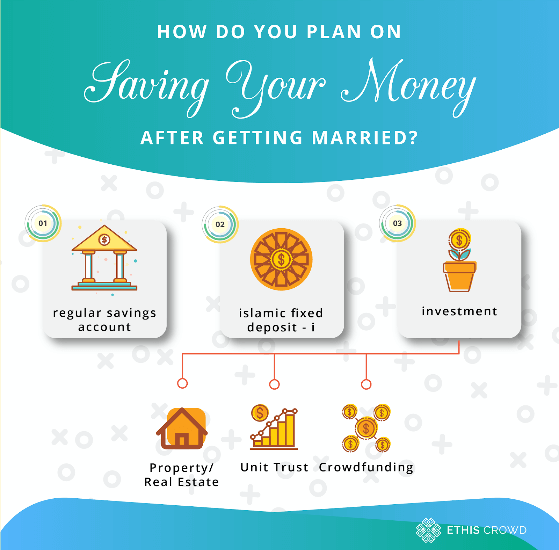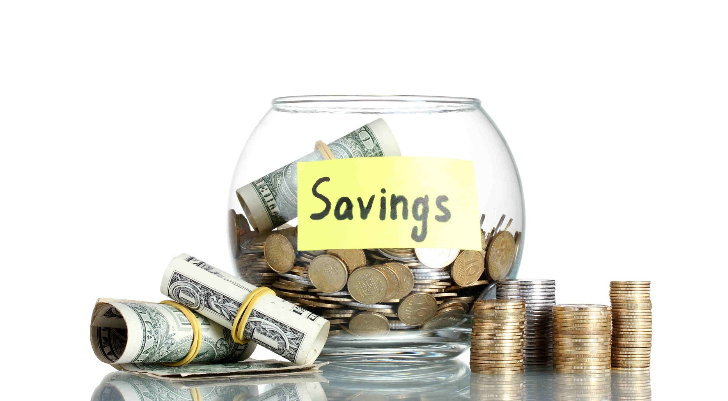
How do you plan on saving and growing your money after getting married?


The majority of people only focus on saving up for marriage ceremonies and are then left financially drained for marriage life itself. Marriage life starts with the ceremony and continues on for up to a whole lifetime. Financial commitments also tend to increase significantly over time as the family grows. Therefore, it is important to have plans not only to save your money but to grow it as well.
As Muslims, deciding on products and services that comply with the fundamental requirements of Islamic law is of great importance to us and this includes where we put our money. Here’s a list of Shariah-compliant financial planning options that may be available in your country;
Option 1: Basic Islamic Deposit Account
If your goal is to only save money and not focused on looking for returns, this would be the best option. A basic deposit works like a trusted piggy bank where you free to either deposit or withdraw money at your own free will.
As the name suggests, this type of account requires no commitment to save any sum of money every month. It does not have any strict conditions such as penalties for payments, limited withdrawals before the maturity period, and restricted or fixed amount of monthly deposits.
The bank may charge an annual fee for the services provided. Depositors may enjoy Hibah or bonus reward from their savings accounts. However, it will only be given at the bank’s sole discretion and is not guaranteed. If you are looking for safekeeping, then look no further.
Bear in mind that money loses value over time due to higher prices (inflation) and typically the returns from a savings account is lower that inflation. This means that although you earn some returns, in the end, you typically lose value.
Option 2: Islamic Fixed Deposit
Islamic Fixed Deposit is a type of deposit account where a sum of money is placed for a certain period of time with a specific fixed return. The returns offered will not be jaw-dropping but you will be receiving better returns than basic deposit accounts.
In fixed deposit accounts, the deposit is made at the time of account opening and it promises the depositors fixed returns, depending on the deposited amount and the opted deposit tenure. It limits the withdrawal throughout the term of your preference; it can range as short as a month to as long as five years.
Should any money be withdrawn before the maturity period, the consequences include the loss of returns and is subject to the bank’s terms and condition.
For those who seek small profit, fixed deposit accounts would be the better alternative if you prefer a less risky route where returns are always guaranteed.
Option 3: Islamic Investment
There are a lot of long-term investment opportunities available for you to explore. Here is a list of some of the best Investments that can maximise the funds we have at hand:
#1 Property or Real Estate
Property investment could be the breakthrough in your financial plan if done correctly. The value-driven real estate market with its solid asset backing has given investors a sense of security coupled with attractive returns.
Even though the price of houses is now slowing down due to a number of factors, including stricter lending guidelines, investors shall not worry as the housing market in Malaysia is expected to perk up in the years ahead through to 2020 (Malaysian Institute of Estate Agents 2018).
One of the real estate investment innovations is called Real Estate Investment Trusts (REITs). REITs were established for individual investors to acquire ownership in commercial real estate and receive income from the properties invested.
The pluses of investing in REITs include affordable starting capital, the ability to own a part of commercial properties, earning regular dividends on a quarterly or monthly basis depending on the trusts, ease of selling and buying REITs stocks, and the little effort required.



As interesting as it may seem, the risks of REITs must also be considered before investing. The risks include the inability to grow or reinvest in the same portfolio resulting in the stagnant of dividend in several years. As the focus of REITs is on properties, it would be heavily impacted once the property market faces a downturn.
Generally, due to the stability of dividend income and uprising prices of REITs properties, it is a good investment plan to consider.
#2 Unit Trusts
A unit trust (or mutual fund in the U.S) is a collective investment fund that pools funds from investors in order to hold assets and gain profits, credited directly to the individual unit owners. The typical investments of a unit trust fund include equities, bonds and assets. The fund is managed and operated by a fund manager, following the main objectives and goals of the fund.
Unit trusts’ owners are known as unit holders. The value of the assets is determined by multiplying the number of units issued with the price per unit. It also important to take into consideration costs that may incur when investing in a unit trust fund such as management charges, transaction cost, processing fee, etc.
Make sure to check the track record of the fund performance. Generally, banks’ unit trust funds give a return of about 3 to 4.0% per annum while other unit trust companies usually project a higher return due to the higher risks involved in those investments.
Before investing, consider the risks that come along with unit trust investment. Among the risk factors are; liquidity risk, low-performance and the general risk of the market due to the change in regulatory framework, economic development, government policies and many more.
#3 Crowdfunding
Crowdfunding is an emerging model where many people (and increasingly institutions) come together to fund projects and campaigns online. Crowdfunding can be applied to charity, to gain a reward or as an investment to gain return. Investment Crowdfunding is growing rapidly globally, with leading platforms having transacted billions of dollars, and most giving returns higher than the general market.
With crowdfunding, more people are now able to invest in previously inaccessible projects and companies such as start-ups and small-to-medium-enterprises (SMEs) and even property projects. The two main types of investment crowdfunding that you could consider are;
- Equity Crowdfunding (ECF)
Equity Crowdfunding ECF allows crowd investors to buy the shares and stocks of a company or business, making them a shareholder of the company. The investment returns are earned when the company makes a profit or when the shares are sold to the market. Investors should be aware that returns are not immediate and at times, delayed.
ECF platform is regulated by the Securities Commission (in Malaysia). Hence, investing your monies in this plan assures a transparent approach. Investment risks are also minimised across a large pool of investors.
- b) Peer-to-peer Crowdfunding
Peer-to-peer (P2P) crowdfunding provides an opportunity for investors of various backgrounds to pool their funds together on an online platform to invest in a specific project. Returns from the investment are given to investors after a specific period of time. P2P crowdfunding platforms most commonly focus on investing in SME projects, although real estate is a fast-emerging trend.
EthisCrowd.com, for example, is a great option to consider for Real Estate Islamic P2P crowdfunding investment as it focuses on impact investment in social housing development projects. Such projects have been proven to give returns north of 10% on an annual calculation and are backed by real assets, which reduces the risk of investment.
Conclusion
As unromantic as it sounds, affection alone is not sufficient in a marriage. Marriage calls for financial stability too to sustain it. This further proves the importance of financial planning and is a crucial topic to be discussed in detail throughout a marriage, as the family goes through different circumstances and phases. All in all, weigh in every possible factor and choose the best saving or investment plan that fits you and your partner’s risk profiles, capital and financial goals.
Read more on 18 Financial Habits to Develop for Better Money Management





Top Posts
Islamic P2P Crowdfunding Explained
Halal Money Matters: How Muslims Can Balance Deen and Dunya with Smart Islamic Finance
Halal Investments for Singapore Muslims? It’s time for a shake-up in the Islamic Investments scene.
Smart investment for making Halal money
3 Reasons Why Property Crowdfunding is the Smart Investment for You